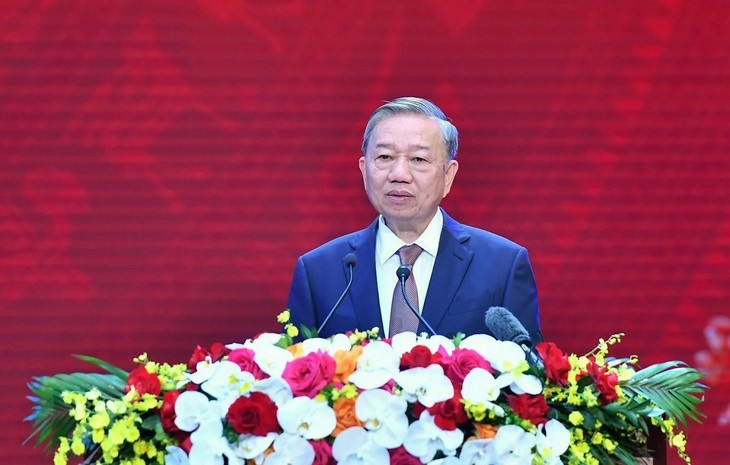(VOVWORLD) - Party General Secretary To Lam wrote an article titled "Rising in international integration" on Thursday. The article underscores international integration as a strategic priority to strengthen Vietnam’s political standing, drive economic growth, safeguard national security, and enhance the country’s global influence. The Voice of Vietnam presents excerpts from the article.
 Vietnamese Party General Secretary To Lam (Photo: VGP) Vietnamese Party General Secretary To Lam (Photo: VGP) |
The General Secretary emphasized that throughout Vietnam’s revolution, its journey of integration and development has always been deeply intertwined with global transformation. In the early days of the nation’s founding, President Ho Chi Minh, in a letter to the United Nations, declared Vietnam’s aspiration to befriend all countries and pursue a policy of openness and cooperation in all fields, which could be considered Vietnam’s first "declaration" on international relations.
Integration has been continuous throughout Vietnam’s revolution
According to General Secretary To Lam, the principle of "combining national strength with the power of the times" has guided the Communist Party of Vietnam (CPV) for over 80 years, continuously aligning Vietnam’s revolutionary path with global progress and humanity’s shared aspirations.
During the Đổi Mới (renewal) period, the CPV recognized that peace and development require openness and cooperation. International integration was identified as the highest form of international cooperation—a way to place Vietnam within global progress, aligning with the world’s economic and political developments in order to increase its strength.
The Communist Party of Vietnam believes international integration should start with economic integration before expanding into comprehensive international cooperation to forge strong diplomatic ties, attract external resources for socio-economic development, and establish its role in global affairs.
General Secretary To Lam said Vietnam is entering a new era of national rise, striving to become a prosperous, strong, democratic, fair, and civilized nation with fresh perspectives, a stronger international position, and a modernized approach to global integration.
The Politburo’s Resolution 59, issued on January 24, 2025, on “International cooperation in the new context” marks a breakthrough in Vietnam’s integration policy, redefining international integration as a major driving force for national advancement, bringing Vietnam into a new era of global engagement.
A significant shift outlined in this resolution is Vietnam’s transition from being a recipient to an active contributor, from deep integration to full integration, from the position of a latecomer to the status of a rising nation pioneering in new fields.
International integration in the new era
In the current period of revolution, the Party and State's guidelines and policies on international integration, along with the requirements, tasks, opportunities, benefits, responsibilities, and obligations of Vietnam in this endeavor, need to be widely disseminated and well understood by the Party, the people, and the army.
According to Mr. Lam, economic integration is the core, and integration in other fields must facilitate economic integration, the top priorities being restructuring the economy, renewing the growth model, and promoting digital transformation.
Vietnam will focus on sectors with advantages and potential and priority will be given to mobilizing resources for key sectors and projects: strategic transportation and energy infrastructure, including high-speed railways, expressways, seaports, and airports; nuclear, wind, and solar power plants; and projects aimed at reducing emissions and achieving carbon neutrality to minimize wastefulness and maximize efficiency, particularly in the context of digital transformation and the Fourth Industrial Revolution.
Vietnam will make the most of international economic commitments, agreements, and linkages, particularly new-generation Free Trade Agreements, to enhance mutually beneficial interests and avoid dependence on partners. Domestic institutions should be consolidated to improve the implementation of international commitments and agreements. Special mechanisms and policies should be developed to attract high-quality Foreign Direct Investment, especially in key emerging sectors and new drivers of labor productivity, such as information technology, telecommunications, semiconductors, and artificial intelligence.
Mr. Lam said political, security, and defense integration must strengthen the nation’s capacity and position, and protect the nation even before it is in danger. With a new position and greater strength, Vietnam can take a leading and reconciling role in multiple fields; contribute more actively to international peacekeeping and search and rescue activities; diversify defense and security cooperation; and develop a modern, self-reliant, and dual-use defense and security industry.
In the current context, science, technology, and innovation must seek breakthroughs, so international integration in those fields must aim at aligning domestic science and technology standards and regulations with advanced international norms and practices.
Vietnam will also accelerate the fine-tuning of institutions and policies, focusing on incorporating international laws into domestic laws to fully, consistently, and effectively implement obligations and commitments. Organizations and associations must improve their oversight in honoring policies, laws, and international integration commitments.
Finally, the Party leader said that in today’s interdependent world, the development of each nation cannot be isolated or immune from the influences of the world or the era, or from current circumstances. Vietnam must keep pace with global developments, find a way to ensure peace, stability, prosperity, and growth, and build a higher and more solid position for the nation in the new era.